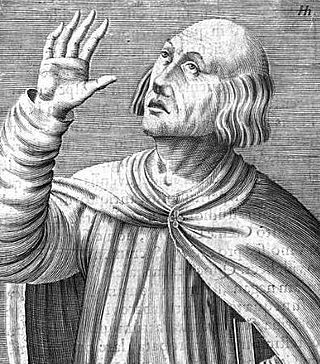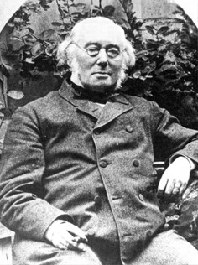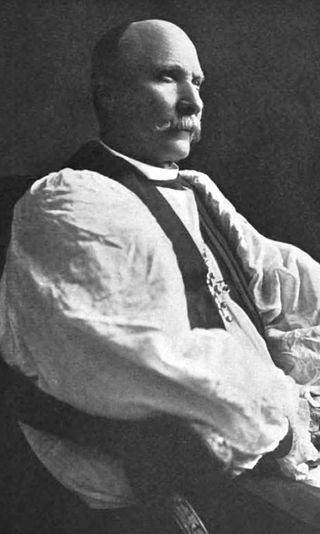Related Research Articles

Berengar of Tours, in Latin Berengarius Turonensis, was an 11th-century French Christian theologian and archdeacon of Angers, a scholar whose leadership of the cathedral school at Chartres set an example of intellectual inquiry through the revived tools of dialectic that was soon followed at cathedral schools of Laon and Paris. Berengar of Tours was distinguished from mainline Catholic theology by two views: his assertion of the supremacy of Scripture and his denial of transubstantiation.
Sola scriptura is a Christian theological doctrine held by most Protestant Christian denominations, in particular the Lutheran and Reformed traditions, that posits the Bible as the sole infallible source of authority for Christian faith and practice. The Catholic Church considers it heterodox and generally the Orthodox churches consider it to be contrary to the phronema of the Church.

Philip Schaff was a Swiss-born, German-educated Protestant theologian and ecclesiastical historian, who spent most of his adult life living and teaching in the United States.
Pietism, also known as Pietistic Lutheranism, is a movement within Lutheranism that combines its emphasis on biblical doctrine with an emphasis on individual piety and living a holy Christian life.

Albrecht Benjamin Ritschl was a German Protestant theologian.
Restorationism, also known as Restitutionism or Christian primitivism, is a religious perspective according to which the early beliefs and practices of the followers of Jesus were either lost or adulterated after his death and required a "restoration". It is a view that often "seeks to correct faults or deficiencies by appealing to the primitive church as normative model".
The Boyle Lectures are named after Robert Boyle, a prominent natural philosopher of the 17th century and son of Richard Boyle, 1st Earl of Cork. Under the terms of his Will, Robert Boyle endowed a series of lectures or sermons which were to consider the relationship between Christianity and the new natural philosophy then emerging in European society. Since 2004, this prestigious Lectures series has been organized, with the assistance of Board of the Boyle Lectures, by the International Society for Science and Religion (ISSR) and has been held at one of its original locations, the Wren church of St Mary-le-Bow on Cheapside in the City of London.

The Schaff–Herzog Encyclopedia of Religious Knowledge is a religious encyclopedia. It is based on an earlier German encyclopedia, the Realencyklopädie für protestantische Theologie und Kirche. Like the Realencyklopädie, it focuses on Christianity from a primarily Protestant point of view. The final edition, titled The New Schaff–Herzog Encyclopedia of Religious Knowledge, was published 1908–14 in 13 volumes, based on the third edition of the Realencyklopädie (1896–1909).
Liberal Christianity, also known as liberal theology and historically as Christian Modernism, is a movement that interprets Christian teaching by taking into consideration modern knowledge, science and ethics. It emphasizes the importance of reason and experience over doctrinal authority. Liberal Christians view their theology as an alternative to both atheistic rationalism and theologies based on traditional interpretations of external authority, such as the Bible or sacred tradition.
In Christianity, confessionalism is a belief in the importance of full and unambiguous assent to the whole of a movement's or denomination's teachings, such as those found in Confessions of Faith, which followers believe to be accurate summaries of the teachings found in Scripture and to show their distinction from other groups. Confessionalists believe that differing interpretations or understandings, especially those in direct opposition to traditionally held teachings, cannot be accommodated within a church communion. A denomination or church that shares these beliefs can be called a confessional denomination or confessional church, respectively.
Conservative Christianity, also known as conservative theology, theological conservatism, traditional Christianity, or biblical orthodoxy is a grouping of overlapping and denominationally diverse theological movements within Christianity that seeks to retain the orthodox and long-standing traditions and beliefs of Christianity. It is contrasted with Liberal Christianity and Progressive Christianity, which are seen as heretical heterodoxies by theological conservatives. Conservative Christianity should not be mistaken as being necessarily synonymous with the political philosophy of conservatism, nor the Christian right.
The Friends of God was a medieval mystical group of both ecclesiastical and lay persons within the Catholic Church and a center of German mysticism. It was founded between 1339 and 1343 during the Avignon Papacy of the Western Schism, a time of great turmoil for the Catholic Church. The Friends of God were originally centered in Basel, Switzerland and were also fairly important in Strasbourg and Cologne. Some late-nineteenth century writers made large claims for the movement, seeing it both as influential in fourteenth-century mysticism and as a precursor of the Protestant Reformation. Modern studies of the movement have emphasised the derivative and often second-rate character of its mystical literature, and its limited impact on medieval literature in Germany. Some of the movement's ideas still prefigured the Protestant reformation.

Samuel Simon Schmucker was a German-American Lutheran pastor and theologian. He was integral to the founding of the Lutheran church body known as the General Synod, as well as the oldest continuously operating Lutheran seminary and college in North America.

In Christianity, God is believed to be the eternal, supreme being who created and preserves all things. Most Christians believe in a monotheistic, trinitarian conception of God, which is both transcendent and immanent. Most Christians believe in a singular God that exists in a Trinity, which consists of three persons: God the Father, God the Son, and God the Holy Spirit. Christian teachings on the transcendence, immanence, and involvement of God in the world and his love for humanity exclude the belief that God is of the same substance as the created universe but accept that God the Son assumed hypostatically united human nature, thus becoming man in a unique event known as "the Incarnation".

Protestantism is a branch of Christianity that emphasizes justification by God through faith alone, the teaching that salvation comes by unmerited divine grace, the priesthood of all believers, and the Bible as the sole infallible source of authority for Christian faith and practice. The five solae summarize the basic theological beliefs of mainstream Protestantism.
Andrew of Carniola was a Roman Catholic archbishop from Carniola, in present-day Slovenia.

Charles Minnigerode Beckwith was fourth bishop of the Episcopal Diocese of Alabama from 1902 till 1928.

Henry Addison Nelson was a Presbyterian clergyman. "He was educated at Hamilton College, Clinton, N. Y., after which he taught at Eaton, N. Y., and Homer, N. Y., until 1843, when he entered Auburn Theological Seminary, from which he was graduated in 1846." He then held the pulpit at the First Presbyterian Church, Auburn, N. Y. (1846–56) and at the First Presbyterian Church, St. Louis (1856–68). He was "professor of systematic and pastoral theology at Lane Theological Seminary, Cincinnati (1868-74), pastor of the First Presbyterian Church at Geneva, N. Y. (1874-1885), and acting pastor at Independence, Mo. (1885-86)." He was also for many years editor of the Church magazine, The Church at Home and Abroad. The Henry A. Nelson Memorial Boys' School, in Tripoli, Lebanon, was named after him.

Walter Frederic Adeney was an English Congregationalist minister, theologian, and biblical scholar. Born in Ealing in 1849, he was educated at New College and University College London. He served as a minister in Acton from 1872 to 1889 and became a lecturer in biblical and systematic theology at New College, London, in 1887. He was promoted to a professorship in New Testament exegesis and church history at New College in 1889, before moving to become Principal of Lancashire Independent College in Manchester in 1903. In addition to the numerous works he wrote on the Bible, for both academic and popular audiences, Adeney was general editor of the Century Bible Commentary, and in 1908 he published an extensive history of Eastern Christianity, The Greek and Eastern Churches. He retired in 1913, and died in Lewes on 1 September 1920.
References
- ↑ Herzog, J.J.; Schaff, P.; Hauck, A.; Jackson, S.M.; Sherman, C.C.; Gilmore, G.W. (1910). The New Schaff-Herzog Encyclopedia of Religious Knowledge: Embracing Biblical, Historical, Doctrinal, and Practical Theology and Biblical, Theological, and Ecclesiastical Biography from the Earliest Times to the Present Day. The New Schaff-Herzog Encyclopedia of Religious Knowledge. Funk and Wagnalls Company. p. 279. Retrieved 2023-03-07.
- 1 2 Müller, Daniela (2011-04-01). "Ortlieb of Strasbourg". Religion Past and Present.
- ↑ Brackney, William H. (2012). Historical Dictionary of Radical Christianity. USA: The Scarecrow Press, Inc. p. 234. ISBN 978-0-8108-7365-0.
- ↑ "Ortlibarii | Encyclopedia.com". www.encyclopedia.com. Retrieved 2020-02-02.
- ↑ "Ortlieb of Strasbourg".
- ↑ Cohn-Sherbok, Lavinia (2013-05-13). Who's Who in Christianity. Routledge. ISBN 978-1-134-77893-5.
- ↑ Jones, Rufus M. (1909). Studies in Mystical Religion. Eugene, Oregon: Wipf & Stock. p. 192. ISBN 1-59244-968-9.